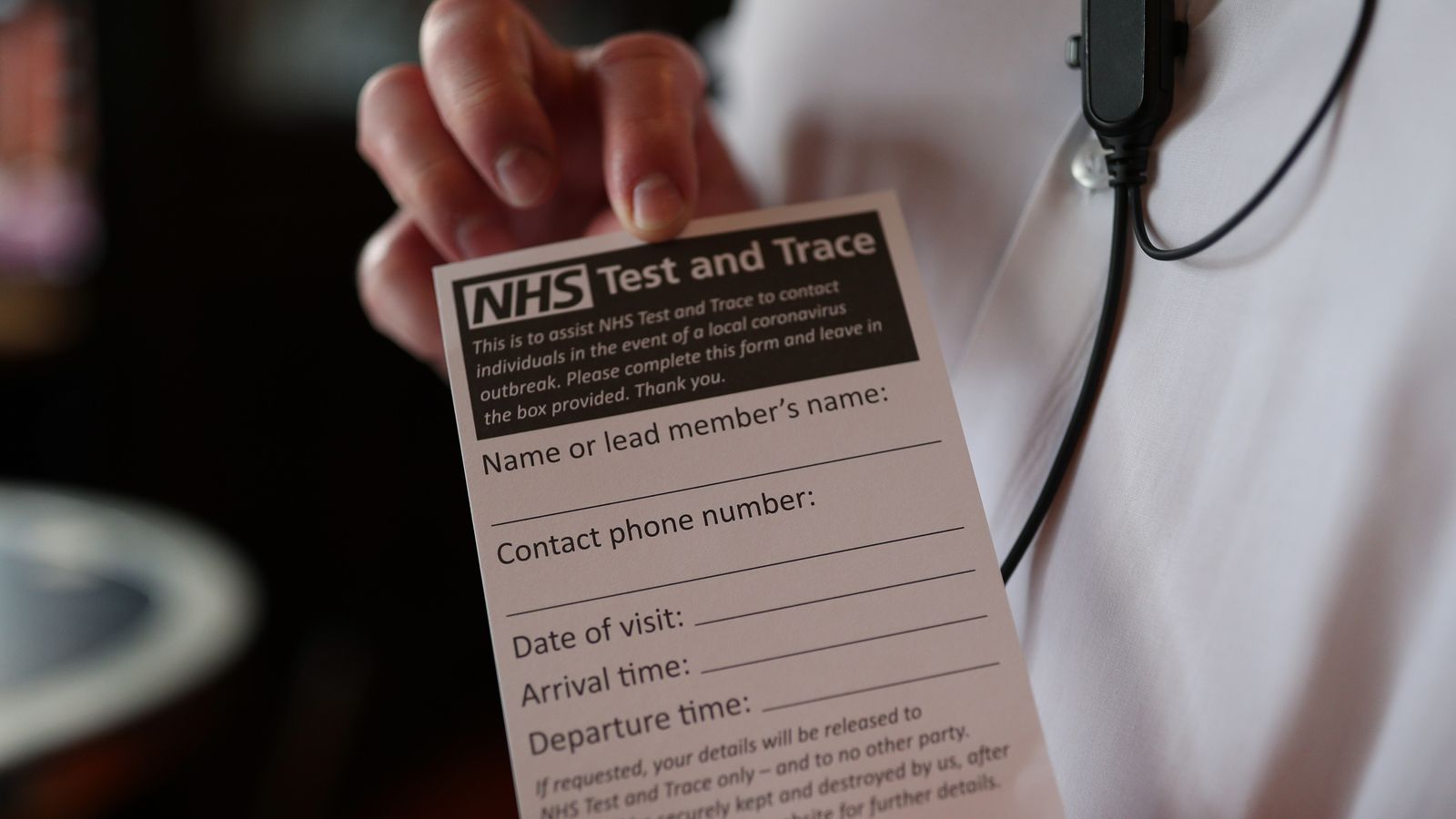The sharp rise in coronavirus cases is stretching the capacity of the Test and Trace service, forcing untrained staff to take on contact-tracing jobs, according to a leaked internal email seen by Sky News..
The measures taken to strengthen the service have raised disquiet inside Test and Trace, as staff from outsourcing firms will now take on jobs previously performed only by medically-trained contact tracers.
The email, which was sent to contact tracers last night, says that the jump in cases has created “a surge in demand”, producing “an immediate challenge to the capacity of the Test and Trace service.”
In response, the email says, staff employed by outsourcing firms Serco and Sitel will begin identifying contacts and taking their contact details – work previously handled by clinically-qualified contact tracers.
The email says that “experienced agents from Serco and Sitel” will make this move “from tomorrow”. Sky News understands that this refers to Level 3 contact tracers, some of whom have been working on Test and Trace since it was launched in May.
Under the categorisation system employed by Test and Trace, clinically-trained Level 2 staff identify the contacts of people who test positive and obtain their contact details, which are then passed to call centre staff in Level 3, who phone to let people know they need to isolate.
It is unclear whether the move is permanent, although the email says that NHS Professionals, which supplies temporary staff to the NHS, is “currently working hard to increase capacity”.
The change has caused disquiet among contact tracers, who say that job specifications for Level 2 roles clearly state that medical qualifications are required.
A job advert posted in May by NHS Professionals as part of the “Join the Virtual Frontline” campaign says that “the skills and experience required for this position are at a Clinician Band 6 level” – a level obtained by pharmacists, dentists, vets, doctors and most nurses.
Public health experts have questioned the move, which comes into effect immediately.
“Contact tracing is something that requires a high level of skill. Given the poor performance of the national scheme so far, it will be important to monitor the impact of this change closely,” said Martin McKee, professor of European public health at the London School of Hygiene and Tropical Medicine.
“Asking call centre staff to take on roles meant for clinically-trained people is risky and likely to make performance of Test and Trace worse,” said Christina Pagel, professor of operational research at University College London.
“The whole situation shows that at current levels of new cases per day, any contact tracing system is likely to struggle and highlights the necessity of reducing case numbers quickly through a short circuit break.”
The campaign recruited 3,000 clinically-trained contact tracers and 18,000 call centre staff, who were hired through outsourcing firms Serco and Sitel. Yet after stories emerged of contact tracers being paid to do nothing, 6,000 jobs were cut from the service in August.
Serco and Sitel have been heavily criticised for their role in the struggling service, which is currently only reaching 62% of contacts of positive cases, according to the latest official figures.
Serco CEO Rupert Soames recently defended his firm’s record, saying on Twitter: “Of the people Serco are tasked to phone, for whom we are given correct contact details… we reach over 90%.”
Mr Soames added that “we are not responsible for identifying contacts or getting their contact details.” The latest change means that will no longer be the case.
:: Subscribe to the Daily podcast on Apple Podcasts, Google Podcasts, Spotify, Spreaker
Sources inside Test and Trace confirmed that the system was stretched by the recent rise in cases, but added that the burden had also been increased by the “loss” of almost 15,000 positive cases as a result of an Excel spreadsheet error, which caused a sudden influx of people who tested positive for contact tracers to trace.
The latest move is one of a number of changes designed to increase the efficiency of the Test and Trace system. Earlier in the month, a leaked email seen by Sky News showed that single cases in educational settings would no longer be followed up by local public health teams.
Isolated cases in nurseries, schools, universities and colleagues would instead be treated in the same way as cases in the community, with contact tracing done by Level 2 contact tracers instead of specialist teams.
The Department for Health and Social Care did not respond to a request for comment.


